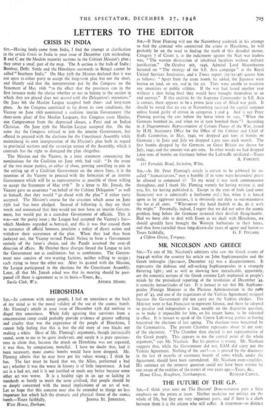HIROSHIMA
SIR,—In common with many people, I feel an uneasiness at the back of my mind as to the moral validity of the use of the atomic bomb. Mr. Fleming's article in your issue of December 13th did nothing to dispel this uneasiness. While fully agreeing that survivors from a concentration camp could probably provide evidence of greater suffering and cruelty than was the experience of the people of Hiroshima, I cannot help feeling that this is but the old story of two blacks not making a white. Most of Mr. Fleming's arguments, though intrinsically sound, seem to me to be quite irrelevant, and surely it is pure specious- ness to claim that, because the attack on Hiroshima was not repeated, it was thus, by comparison, merciful. I have no doubt that, had it been necessary, more atomic bombs would have been dropped. Mr. Fleming admits that he may have got his values wrong ; I think he has. The fact must be faced that we, the Allies, performed a bad act ; whether it was the worst in history is of little importance. A bad act is a bad act, and it is not justified or made any better because some other act was worse. It is a healthy sign in an age so lacking in standards as barely to merit the term civilised, that people should be so deeply concerned with the moral implications of an act of war. Let us hope that this concern may also be extended to things no less important but which lack the dramatic and physical threat of the atomic






























 Previous page
Previous page